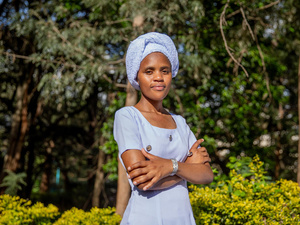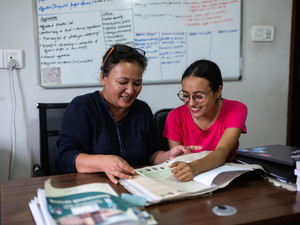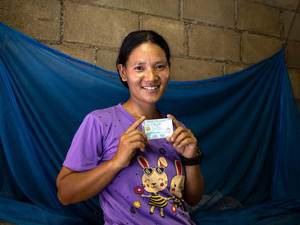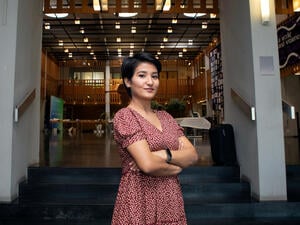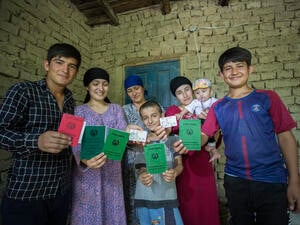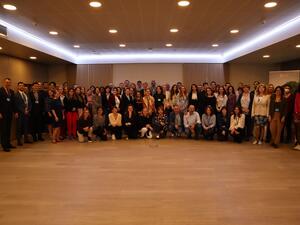Q&A: Brazil's Justice Minister committed to helping the displaced and stateless
Q&A: Brazil's Justice Minister committed to helping the displaced and stateless

Brazil's Justice Minister Luiz Paulo Barreto.
BRASILIA, Brazil, November 9 (UNHCR) - In recent years, Brazil has become one of UNHCR's most important partners in South America. That relationship will be further strengthened this week when Brazil's Justice Ministry hosts the "International Meeting on Refugee Protection, Statelessness and Mixed Migratory Movements in the Americas." The gathering on Thursday in Brasilia will discuss progress in the 2004 Mexico Plan of Action as well as statelessness and the increasingly important regional issues of resettlement and mixed migration flows. It will also kick off the UN refugee agency's 60th anniversary commemorations in the Americas and adopt the "Brasilia Declaration on the Protection of Refugees and Stateless Persons in the American Continent." To mark the occasion, Justice Minister Luiz Paulo Barreto discussed his country's asylum policies and the goals of the meeting with UNHCR Assistant Public Information Officer Luiz Fernando Godinho. Excerpts from the interview:
Officials from 20 countries will join the meeting. Why is it important?
It is a first step for an integrated protection response in the Americas covering refugees, other forcibly displaced populations and statelessness. Our region has experienced, and is still experiencing, several refugee situations and needs to have an efficient mechanism that provides support for affected populations. Responsibility must be shared and solutions must be sought and implemented at a regional level. The Americas must be a safe place that provides effective international protection for these people.
What results do you expect?
I hope this meeting will make participants aware of the importance of promoting national refugee laws. Adherence to the 1951 UN Convention [relating to the Status of Refugees] entails an international legal obligation, but it is quite difficult to make government officials and the judiciary understand the importance of an international convention. It is much easier to go through an internal law that regulates the convention. Brazil did this in 1997 and the developments since have been significant at the federal and state levels and within the judiciary. Brazil´s refugee law created a framework that is applied routinely, with duties and rights for the refugees.
Delegates will be reviewing the Mexico Plan of Action, which was adopted to safeguard refugees in Latin America. How important is it for the Americas?
The Mexico Plan of Action remains important for refugee protection because it requires that countries share the responsibility for supporting those affected.
Brazil was one of the 20 signatories. What changes and challenges has it brought?
Brazil participated in the drafting and passage of the Mexico Plan of Action and has been resettling refugees from this region and from outside the region [under its principles]. We have helped Colombian, Palestinian and Afghan refugees . . . We have a fast track system that approves resettlement cases in 48 hours.
What are your thoughts on mixed migration flows in the Americas?
It is important to receive these people and to distinguish between refugees and migrants. Countries must adhere to the principle of non-refoulement [no forced return] and use humanitarian and human rights laws to address the situation. In recent years, in several parts of the world, migration has been wrongly linked to criminal law. Even irregular migration should be addressed in a way that allows migrants to return to their country of origin in safety . . . Each country has the right to control migratory movements within its borders, but should not ignore their international legal obligation to protect and respect the principle of non-refoulement.
More than half of the world's refugees live in urban areas. Is this so for Brazil?
Most of the refugees arriving in Brazil have an urban background and they want to rebuild their lives in urban settings. They face obstacles in big cities, related to local integration, employment and culture. The main problem is becoming self-sufficient. Refugees should not become dependent on the government or on a country´s social welfare network. They should receive a first emergency assistance to help rebuild their life with dignity and respect. This rebuilding process should include self-sufficiency. In Brazil, we encourage skills training, with the support of our partners in civil society. It is also important that different cultures coexist in peace, as happens in Brazil.
Brazil is a signatory of the 1961 Convention for the Reduction of Statelessness. What are your policies on statelessness?
Brazil has internal mechanisms to prevent statelessness . . . Anyone who is born in Brazil is considered Brazilian, while children of Brazilians born in other parts of the world are also Brazilians. Our constitution also prohibits the loss of nationality through renunciation where this would leave someone stateless. For stateless people arriving in Brazil, our law provides for them to receive a special passport, to register themselves and to acquire the same rights as our citizens.
Tell us a bit about the National Committee for Refugees, or CONARE
It is essential that countries dealing with refugees should have a specialized body to deal with refugee eligibility and refugee policies and that this body should be as independent as possible . . . Brazil established the National Committee for Refugees 12 years ago with the participation of civil society and UNHCR. The UN agency has a voice in CONARE but no right to vote. It provides important technical and legal expertise and advice. This Brazilian tripartite model [government, civil society and UNHCR] is very important to guarantee CONARE´s independence. Moreover, CONARE's decisions can be appealed by asylum-seekers.
Brazil has generous policies towards refugees, but sometimes they face problems getting access to things such as employment, education and social programmes
We need to move forward on this and we consider that the best way is to raise awareness. Some refugees complain that when they present their documentation, employees see them as fugitives, subversive or criminals. On the contrary, these people are victims of persecution. The sensitization of society is the best way to guarantee their rights.
UNHCR, by correctly promoting the refugee issue, has been helping to change this culture of discrimination that can block people from accessing rights guaranteed by law. I am convinced that such difficulties are more due to ignorance than to shortcomings in the judiciary or administration.
On the eve of our 60th birthday, how do you rate UNHCR's work in Brazil?
It is terrific. At times of crisis, such as during the arrival of Angolan refugees in 1991 and 1992, UNHCR helped Brazil with the reception of these people. More importantly, UNHCR has also helped Brazil to improve its refugee policies. For instance, in 1985 and 1986 UNHCR convinced Brazil to ignore geographical barriers and accept Ba'hai Iranian refugees. Furthermore, UNHCR sensitized Brazil´s Ministry of Justice and civil society about the importance of having national refugee legislation, which was eventually passed in 1997. UNHCR has done a fantastic job in Brazil. It must continue to be supported and funded by the international community.

